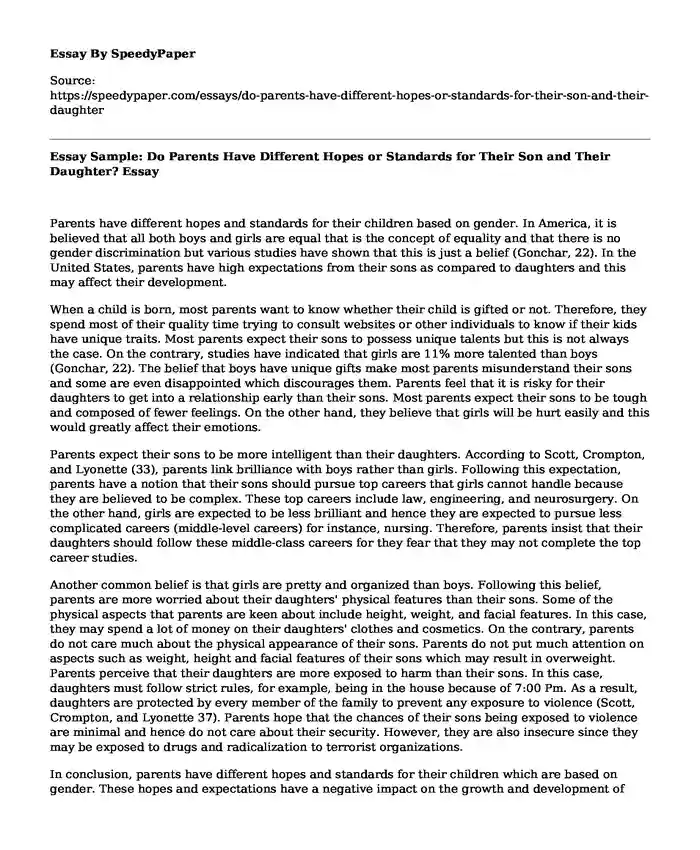
| Type of paper: | Essay |
| Categories: | Discrimination Parenting Child abuse |
| Pages: | 3 |
| Wordcount: | 661 words |
Parents have different hopes and standards for their children based on gender. In America, it is believed that all both boys and girls are equal that is the concept of equality and that there is no gender discrimination but various studies have shown that this is just a belief (Gonchar, 22). In the United States, parents have high expectations from their sons as compared to daughters and this may affect their development.
When a child is born, most parents want to know whether their child is gifted or not. Therefore, they spend most of their quality time trying to consult websites or other individuals to know if their kids have unique traits. Most parents expect their sons to possess unique talents but this is not always the case. On the contrary, studies have indicated that girls are 11% more talented than boys (Gonchar, 22). The belief that boys have unique gifts make most parents misunderstand their sons and some are even disappointed which discourages them. Parents feel that it is risky for their daughters to get into a relationship early than their sons. Most parents expect their sons to be tough and composed of fewer feelings. On the other hand, they believe that girls will be hurt easily and this would greatly affect their emotions.
Parents expect their sons to be more intelligent than their daughters. According to Scott, Crompton, and Lyonette (33), parents link brilliance with boys rather than girls. Following this expectation, parents have a notion that their sons should pursue top careers that girls cannot handle because they are believed to be complex. These top careers include law, engineering, and neurosurgery. On the other hand, girls are expected to be less brilliant and hence they are expected to pursue less complicated careers (middle-level careers) for instance, nursing. Therefore, parents insist that their daughters should follow these middle-class careers for they fear that they may not complete the top career studies.
Another common belief is that girls are pretty and organized than boys. Following this belief, parents are more worried about their daughters' physical features than their sons. Some of the physical aspects that parents are keen about include height, weight, and facial features. In this case, they may spend a lot of money on their daughters' clothes and cosmetics. On the contrary, parents do not care much about the physical appearance of their sons. Parents do not put much attention on aspects such as weight, height and facial features of their sons which may result in overweight. Parents perceive that their daughters are more exposed to harm than their sons. In this case, daughters must follow strict rules, for example, being in the house because of 7:00 Pm. As a result, daughters are protected by every member of the family to prevent any exposure to violence (Scott, Crompton, and Lyonette 37). Parents hope that the chances of their sons being exposed to violence are minimal and hence do not care about their security. However, they are also insecure since they may be exposed to drugs and radicalization to terrorist organizations.
In conclusion, parents have different hopes and standards for their children which are based on gender. These hopes and expectations have a negative impact on the growth and development of kids as some feel inferior to others. For example, daughters may feel unequal to boys because the parent expects them to be less brilliant and this may lead to poor grades. On the other hand, sons feel less protected than girls which may expose them to violence. Parents should realize that daughters and sons are different but equal and therefore they should be treated with the same hopes and standards.
Works Cited
Scott, Jacqueline L., Rosemary Crompton, and Clare Lyonette, eds. Gender inequalities in the 21st century: new barriers and continuing constraints. Edward Elgar Publishing, 2010.
Gonchar, Michael. "Do parents have different hopes or standards for their son and their daughter?" The Learning Network. N.p., 2014. https://learning.blogs.nytimes.com/2014/01/22/do-parents-have-different-hopes-and-standards-for-their-sons-and-daughters/. Web 11 Feb. 2019
Cite this page
Essay Sample: Do Parents Have Different Hopes or Standards for Their Son and Their Daughter?. (2022, Nov 16). Retrieved from https://speedypaper.com/essays/do-parents-have-different-hopes-or-standards-for-their-son-and-their-daughter
Request Removal
If you are the original author of this essay and no longer wish to have it published on the SpeedyPaper website, please click below to request its removal:
- Essay Sample on Benefits of Playing Sports
- Memorable Event Essay Example
- Free Essay on Engagement and Assessment of Communities
- Essay Sample on Charles Conaway: Ethical Failures
- Essay Sample: The Treatment Plan
- Zeddy Business Opportunity Analysis - Paper Example
- Free Essay - Terminating Employer-Employee Relationship
Popular categories




